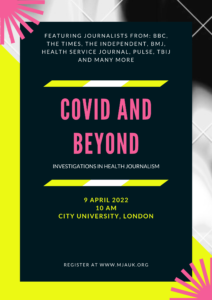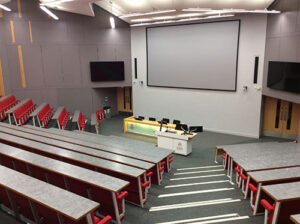
 Videos and resources from this event can be found in our members’ only resources section
Videos and resources from this event can be found in our members’ only resources section
Download Final Details for Attending this MJA Event(PDF): Registration, map, covid safety, programme etc
NB: Printed programmes will not be supplied at the event
Want to develop your investigative journalism skills? In conjunction with City, University of London, the MJA is holding a one-day symposium for MJA members, health and medical journalism students and journalists working in health and medicine. During the day you will hear from a panel of expert investigative journalists and take part in skills based workshops on podcasting, data journalism and ideas development/pitching. The registration deadline has now been extended but as catering had to be booked by end of March, special diets other than vegetarian/vegan can no longer be accommodated.
Investigations in health journalism: Covid and beyond
10:00 – 17:00 Saturday April 9, 2022
Oliver Thompson Lecture Theatre, City, University of London, Tait Building, Northampton Square, EC1V 0HB
Programme:
10:00 Welcome from Nigel Praities, Executive Editor, The Pharmaceutical Journal & Chair of the MJA, and Mark Honigsbaum, Senior Lecturer, Department of Journalism City, University of London
10:00 – 13:00 (including coffee break and Q&A) Plenary session: Investigative Journalism – Chaired by Mark Honigsbaum, Senior Lecturer, Department of Journalism City, University of London
Rachel Schraer (BBC): Inside NHS Test and Trace
Rebecca Thomas (The Independent): Reporting on mental health during the pandemic
Rosa Furneaux (TBIJ): How Covax failed to deliver
George Greenwood (The Times): The truth behind PPE contracts
13:00 – 14:00 Sandwich lunch
14:00 – 16:00 Workshops
Workshop 1: Podcasting with Richard Hollingham from Science Boffin Media
Workshop 2: Data journalism: getting the most out of surveys and mass testimony investigations with Amara Sophia Elahi, Impact reporter BBC news
Workshop 3: Developing ideas and pitching with Emma Wilkinson, Freelance Medical and Health Journalist & Vice Chair of the MJA
16:00 – 16:15 Tea
16:15 – 17:00 Panel Discussion – Medical Journalism post-Covid – Chaired by Nigel Praities, Executive Editor, The Pharmaceutical Journal & Chair of the MJA
Panelists:
Rebecca Coombes, Head of Journalism, BMJ
Lawrence Dunhill, Bureau Chief, Health Service Journal
Catherine Jones, Health Correspondent, Channel 5 News
Sofia Lind, Deputy Editor, Pulse
Meet the speakers and find out more about their sessions

Oliver Thompson Lecture Theatre, City, University of London
Cost of registration:
City University, London students FREE (NB: registration still required) – see our membership offer below for students wishing to join the MJA
MJA student members FREE (NB: registration still required)
Other students (either journalism or health/medical) £5 – see our membership offer below for students wishing to join the MJA
MJA members £30
Non-members £50 (Why not join the MJA if you are eligible and receive the discounted rate for the symposium? You can complete the registration form and pay the MJA members’ rate whilst your application is processed)
Membership Offer:
For students attending the Symposium the MJA will offer one years’ student membership at the discounted rate of £10. If you wish to take up this offer complete our membership application form and enter ‘Symposium’ in the offer code box


Recent Comments